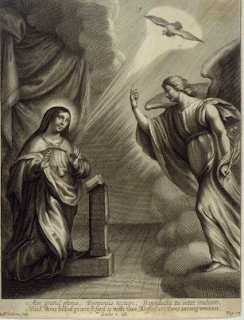'Quiet religion and silent piety': Jeremy Taylor on the Blessed Virgin as the model of contemplation
What then follows is profoundly beautiful meditation on the "quiet religion" of the Blessed Virgin, with Mary a model for the vast majority of Christians in a way that is not and cannot be so with Saint Paul. What is more, Taylor here presents the Blessed Virgin as a contemplative, encouraging us in a "quiet and silent piety", in "those graces which walk in a veil and silence". As Taylor said elsewhere, these are "the essential parts of Religion rather than by the uncertain significations of any exterior adherencies".
Taylor's meditation on the Annunciation, therefore, calls us to become Marian in contemplation and "quiet religion", our heart, mind, and soul fixed upon - to use words from the opening of Taylor's meditation - "the glory and eminencies of the divine love manifested in the incarnation of the Word eternal".
And it is not altogether inconsiderable to observe, that the holy virgin came to a great perfection and state of piety by a few, and those modest and even, exercises and external actions. St. Paul travelled over the world, preached to the Gentiles, disputed against the Jews, confounded heretics, wrote excellently learned letters, suffered dangers, injuries, affronts, and persecutions to the height of wonder, and by these violences of life, action, and patience obtained the crown of an excellent religion and devotion: but the holy virgin, although she was engaged sometimes in active life, and in the exercise of an ordinary and small economy and government, or ministries of a family, yet she arrived to her perfections by the means of a quiet and silent piety, the internal actions of love, devotion, and contemplation: and instructs us, that not only those who have opportunity and powers of a magnificent religion, or a pompous charity, or miraculous conversion of souls, or assiduous and effectual preachings, or exterior demonstrations of corporal mercy, shall have the greatest crowns, and the addition of degrees and accidental rewards; but the silent affections, the splendours of an internal devotion, the unions of love, humility, and obedience, the daily offices of prayer and praises sung to God, the acts of faith and fear, of patience and meekness, of hope and reverence, repentance and charity, and those graces which walk in a veil and silence, make great ascents to God, and as sure progress to favour and a crown, as the more ostentatious and laborious exercises of a more solemn religion ... Many times God is present in the still voice and private retirements of a quiet religion, and the constant spiritualities of an ordinary life.
(The illustration is by William Faithorne, for an early edition of The Great Exemplar.)




Comments
Post a Comment